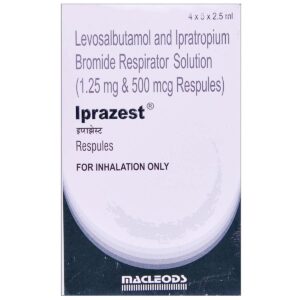IPRATROPIUM + LEVOSALBUTAMOL
Ipratropium: Ipratropium is a medication used to treat breathing difficulties associated with chronic obstructive pulmonary disease (COPD), including chronic bronchitis and emphysema. It belongs to a class of drugs called anticholinergics.
The mechanism of action of ipratropium involves blocking the action of acetylcholine, a neurotransmitter that causes constriction of the airways. By inhibiting the effects of acetylcholine, ipratropium helps to relax and widen the airways, making it easier to breathe. It also decreases glandular secretions in the respiratory tract.
Ipratropium is commonly available as a metered-dose inhaler (MDI) and as a solution for nebulization. The usual recommended dose for adults with COPD is 2 inhalations (42 micrograms per inhalation) administered 4 times a day. For nebulization, a dose of 0.5 mg to 1 mg mixed with the appropriate volume of normal saline is typically used.
Common side effects of ipratropium may include dry mouth, throat irritation, cough, headache, dizziness, and blurred vision. These side effects are generally mild and transient. Some people may also experience urinary retention, especially in individuals with pre-existing urinary tract conditions. If symptoms of urinary retention, such as difficulty urinating or a decrease in urine output, occur, it is important to seek medical attention promptly.
It is worth noting that ipratropium is not a rescue medication for acute asthma attacks, but rather a long-term maintenance therapy for COPD. Therefore, it should not be used for sudden breathing difficulties or as a replacement for rescue inhalers. If you experience a worsening of symptoms or sudden difficulty breathing, seek immediate medical assistance.
Levosalbutamol: Levosalbutamol, also known as levalbuterol, is a bronchodilator drug that is primarily used for the treatment of bronchospasm in patients with conditions such as asthma and chronic obstructive pulmonary disease (COPD).
The mechanism of action of levosalbutamol involves stimulation of beta-2 agonist receptors in the smooth muscles of the airways. This stimulation leads to relaxation of the bronchial muscles, resulting in the dilation of the airways and improved airflow. It also exhibits less binding affinity to beta-1 adrenergic receptors, reducing the potential for cardiovascular side effects compared to racemic salbutamol.
Levosalbutamol is available in various formulations, including inhalers and nebulizers. The dose and frequency of administration depend on the severity of the condition and the specific formulation used. Typically, the recommended dose for adults is 0.63-1.25 mg administered three to four times a day. However, the specific dosing instructions should always be followed as prescribed by a healthcare professional.
Like any medication, levosalbutamol can have side effects. The most commonly reported side effects include headache, tremors, nervousness, palpitations, tachycardia (rapid heart rate), and throat irritation. These side effects are generally mild and temporary. Less frequently, levosalbutamol can also cause more serious side effects such as worsening bronchospasm, chest pain, allergic reactions, and cardiovascular effects such as hypertension or arrhythmias. It is important to seek prompt medical attention if any severe side effects occur.
It is worth noting that levosalbutamol should be used with caution in patients with cardiovascular disorders, such as hypertension, arrhythmias, or ischemic heart disease, as it can increase heart rate and blood pressure. In addition, it may interact with other medications, so it is important to inform your healthcare provider about all the drugs you are taking.
Overall, levosalbutamol is an effective bronchodilator for the treatment of bronchospasm in conditions such as asthma and COPD. It works by relaxing the muscles in the airways, improving airflow. While it is generally well-tolerated, it can have side effects, and it is important to follow the prescribed dose and seek medical advice if any concerns arise.


